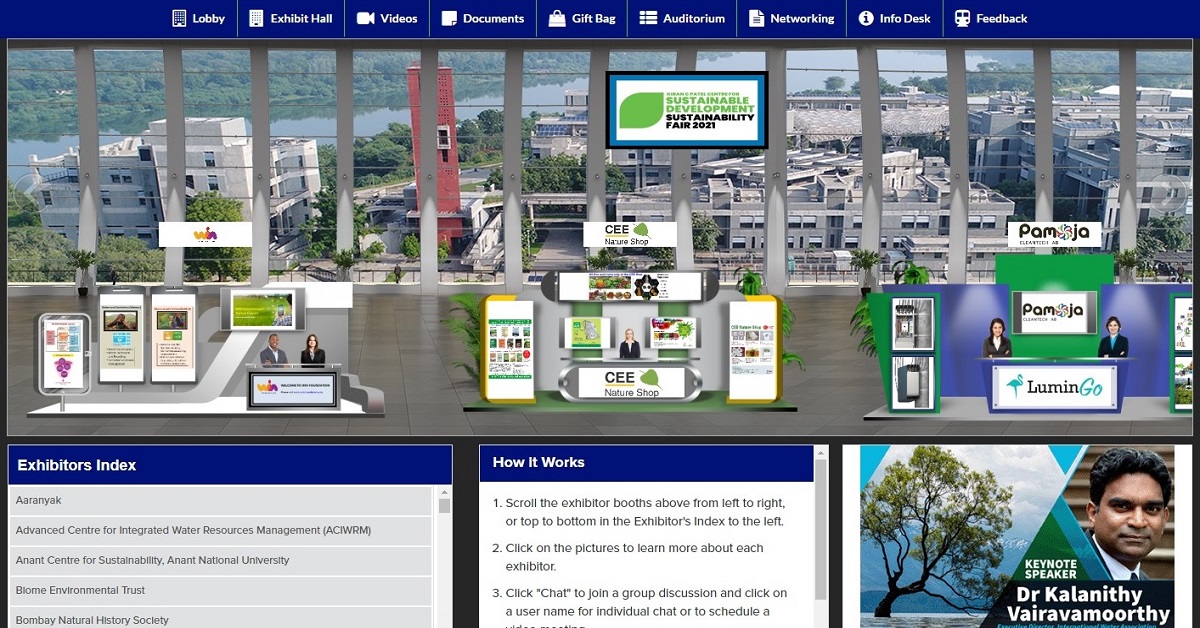STORY CREDITS
Writer/Editor: Shivangi Vasudev Bhatt
Photo: Media and Communication, IIT Gandhinagar
Shri Vijay Rupani, Hon Chief Minister of Gujarat, virtually addressed the third annual Sustainability Fair of Dr Kiran Patel Centre for Sustainable Development (KPCSD) at IITGN today. Shri Vijay Rupani, Hon’ble Chief Minister of Gujarat, virtually addressed the delegates and emphasised on the importance of working together for our environment for a better future. He shared details of the Government of Gujarat’s significant initiatives and policy decisions on renewable energy and water conservation, including the government’s goal to increase solar energy generation upto 30,000 MW by 2022, promotion of solar rooftop system that has enabled thousands of people to become energy producers instead of energy consumers, Kisan Suryodaya Yojana, installation of desalination plants in Mandvi and Kutch, desilting of lakes and rivers for water conservation, and e-vehicles policy. Concluding his inaugural speech, the Chief Minister said, “Change is a collaborative process. We all need to come forward to contribute to sustainable development. We need to make continuous efforts to make our future better than the present. Innovation and enterprise can open new paths in this direction. I am sure IITGN and KPCSD will take forward this work.” Shri Rupani congratulated IITGN, KPCSD, and all stakeholders for organising and participating in the Sustainability Fair for mutual collaboration.
Earlier to the CM’s address, Prof Sudhir K Jain, Director, IITGN gave welcome remarks and introduction to IITGN’s efforts for a green and sustainable campus and said, “Sustainability has been one of the defining principles of IITGN’s campus development. Today’s fair adds to the efforts by IITGN and KPCSD by promoting collaborations among NGOs, scholars, local governments, industries and policymakers to identify and solve sustainability challenges by integrating advanced research, traditional knowledge, and field understanding.”
The event also featured three keynote talks by renowned leaders in the fields of renewable energy and water resources.
It is our moral responsibility to maintain a clean and better environment for our future generation. Excessive exploitation of natural resources has resulted in their fast depletion. Hence, we also need to pay attention to all the aspects of energy and life cycles so that they continue to be available to us without harming the environment. Mahatma Gandhi had also termed air, water and food as symbols of India’s freedom in a meeting held in Ahmedabad on January 1, 1918, which has now been defined as right to life.
Vijay RupaniDr Kalanithy Vairavamoorthy, Executive Director, International Water Association, delivered the first keynote lecture on ‘Challenges and Opportunities for the International Water Sector’. Using various examples and references, Dr Vairavamoorthy said, “Global change pressures will make things difficult in future in terms of water demand and availability, and hence, we need to move on from the vicious path of our 19th century approaches of one-time use and throw water to the virtuous path of digital innovations for better water management. We need to have a holistic view of the entire water cycle. Changing our perspective creates opportunities to do things differently, and digitisation of water and sanitation systems has the ability to give us those opportunities.” He presented examples of how the water and sanitation sector in different countries are getting smarter with adaptive and advanced designs, digital ecosystem, neural networks, cognitive computing, smart pumps, valves, smart sensors, analytics, smart sanitisation for health tracking and early warning etc.
Dr Ashok Das, Founder CEO, SunMoksha, a company that focuses on clean energy resources, gave a lecture on ‘Sustainable Energy as a Catalyst for Rural Development’. Talking about the challenges faced by rural and agricultural communities in remote parts of the country and how they can be uplifted, Dr Das said, “Water and energy are two key components and catalysts for development. We have to work locally and globally to catalyse this development, which is a continuous process. SunMoksha’s mission is to empower villages through technology interventions.” He went on to present case studies where local villagers were trained to become change-makers for sustainability and scalability of their technology interventions for irrigation, water supply, solar electricity, biogas generation, and so on.
Magsaysay Award Winner Dr Rajendra Singh, Chairman, Tarun Bharat Sangh, joined online while travelling to Dehradun to talk about ‘Community Decentralised Water Management: Solution to Climate Change Crisis’. Sharing his experience, Dr Singh said, “In many countries across the world, people get displaced due to mismanagement of water. In India the migration of people due to water scarcity or floods is a major challenge. Pollution, climate change, and changing rain patterns have affected many lives.” He shared case studies from his work experience in Rajasthan and other parts of India and said that water brings happiness in villages. “Technology and engineering knowledge of IITs and Science with common sense needs to be integrated for sustainability. Modern science should start seeing our ancient vision of nature with the five elements to walk on the path of sustainability,” he adds.
The fair also hosted two online networking sessions on ‘Trends and Technologies in Renewable Energy and Water’ and ‘Sustainability Partnerships’. It served as a virtual platform for the participating organisations, industries, and scholars to discuss and explore collaborative opportunities for knowledge transfer and academia-industry partnerships around sustainable development. The event concluded with a panel discussion with Sustainability Officers of major industries and organisations on ‘Sustainability Reporting and Sustainability Finance’.
The virtual exhibition was a unique experience for the participants who could scroll through virtual stalls, projects, best practices, activities, products and services, of some of the leading regional and national industries and organisations working on renewable energy, water and other sustainability issues. A virtual bag enabled the participants to take-away documents and videos of their interest from each booth through emails.
More than 600 people participated during the day-long event from all over the world.
This news was covered by some of the leading Indian newspapers and media agencies. Click on the links below to read more.

